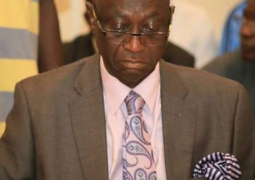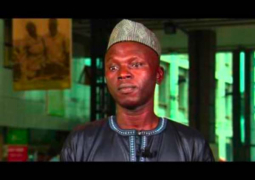
President
Adama Barrow has renewed his commitment for an independent judiciary, saying
his government is committed to providing a sustained conducive environment for
an efficient, transparent and fair legal system in The Gambia.
He
made this remarks during the official opening of the 2019-2020 Legal Year at
the Law Court’s complex in Banjul on Sunday.
“My
Government places the establishment and strengthening of a credible justice
system in The Gambia. Accordingly, the Opening of the Legal Year is always a
significant moment,” he said.
He
added: “It is obvious that sound national justice system administration is
vital for the stability and development of any nation. It is important for all
branches of government and the general public to give the legal and judicial
system the much needed support for it to function responsibly.”
“Looking
back over the 2019 judicial year, the statistics relating to disposal of cases
are encouraging. The year 2019 saw the registration of 8, 178 cases in the
entire court system; 5,446 of these cases were disposed of representing a
disposal rate of 67% leaving 3, 687 cases pending,” Chief Justice Assan B.
Jallow said.
During
that period, he explained, the Supreme Court disposed of 50% of cases as did
the Court of Appeal (74 out of 148) and the High Court (590 out of 1032).
“The
Magistrate’s Courts system disposed of 65% of its 5,655 cases and Cadi Courts
system disposed of 65% of its 1,520 cases. This is a reasonably successful
disposal rate and I would like to seize the opportunity to commend all the
judicial officers and their support staff for this performance.”
“I
would like to single out Brikama Magistrate Court for particular commendation
for the disposal 1,222 of their 1,718 cases (71%) as well as the Kanifing
Magistrate Court which had a higher disposal rate of almost 90% with the
conclusion of 1656 of their 1,981 cases. I wish to commend also the members of
the Bar and other stakeholders for their important contribution to this
outcome. We must however continue to strive towards a higher rate of disposal
without sacrificing the need for proper justice; for a rushed determination of
cases may also result in injustice.”
“Our concern, with particularly the management
of criminal cases where delay often results in prolonged pretrial detention on
remand, led us to experiment with a new initiative. The months of June and July
2019 were exclusively reserved by all the Courts for the review of all pending
criminal cases including the status of those on remand, all of whom were
brought before the Court during that period. Some 962 persons accused of
criminal offences, including all those on remand, were brought before the
Courts and 382 of them were disposed of during those two months, through
convictions, acquittals and discharges from custody. Since then, the rest of
the criminal cases continue to be dealt with by the Courts on a priority basis.
A Stakeholders Committee chaired by the Chief Justice has evaluated the
exercise and made recommendations. Given the success of the experiment, it
should be undertaken periodically. As a result, the judiciary will again be
devoting some weeks in the months of February and March, 2020 exclusively for a
similar exercise. This will help not only expedite these urgent cases but we
hope that it will assist in the decongestion of the remand wing of the
prisons.”
Read Other Articles In Article (Archive)
Brufut Marathon postponed
Jan 9, 2017, 1:44 PM
Former KMC deputy mayor’s trial commences
Nov 27, 2014, 10:03 AM



